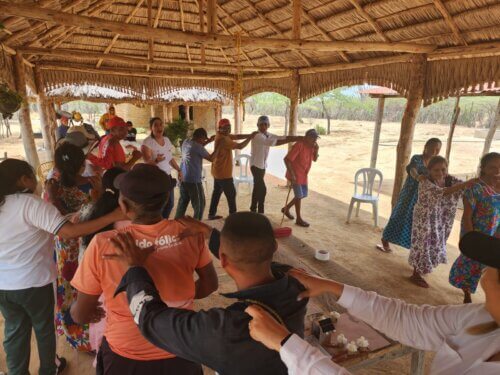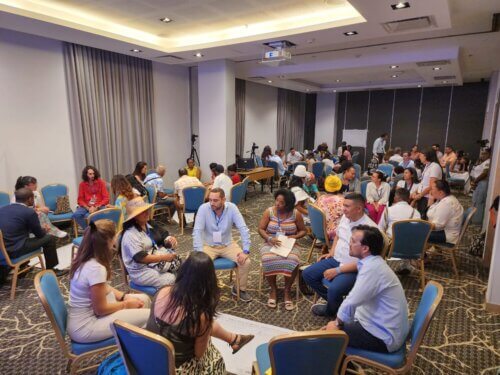“The Governance Action Hub exists to collaboratively explore and expand the frontiers of what is possible in governance reform.”
-Dr. Mario Picon, senior director, Governance Action Hub
The Challenge
Governance systems around the world are grappling with deeply entrenched and persistent challenges. In many contexts, social contracts are fragmented, eroding the sense of collective responsibility and shared goals between people and institutions. Dialogues between stakeholders are often transactional, shaped by low levels of trust and short-term interests rather than long-term collaboration or systemic reform.
Corruption, state capture and poor governance have, in some cases, become normalized, creating environments where reformists — especially civil society and activists — struggle to maintain momentum. This has bred a sense of pessimism and fatigue, particularly among those who have long pushed for transparency and accountability.
Despite decades of investment, traditional Transparency, Accountability, and Participation (TAP) approaches have delivered mixed results. While some interventions have achieved localized or incremental success, most have fallen short of delivering system-wide transformation and responding to the complexity of local contexts.
We believe that to confront these governance challenges, we must find better ways to collaborate and create more pathways for inclusion – especially for those who have been historically excluded from decision-making. We need to create an environment where citizens, governments, civil society and the private sector can work together, identify common goals. We need to explore new ways to engage and solve public problems — rooted in trust, mutual respect, and a recognition of differing perspectives. Above all, we aim to bring governance closer to people. By aligning reform efforts with local priorities and lived experiences, and strengthening coordination between local and global actors, we can unlock more inclusive, responsive, and resilient governance systems. It is our belief that more inclusive and resilient governance systems will help us tackle some of the biggest challenges of our time.
The Opportunity
In recent years, R4D and The Brookings Institution led a series of activities to explore the future of natural resource governance (#futureofNRG) as part of the Leveraging Transparency to Reduce Corruption (LTRC) initiative. Building on a global dialogue that called for broader coalitions and stronger coordination across initiatives, the team launched a global survey to identify emerging priorities in governance reform. The survey revealed a striking disconnect between the governance reforms respondents prioritized and their expectations for actual implementation. In response, the authors highlighted the need for new and more audacious approaches to governance.
As we push for bolder action, we recognize the importance of identifying and building complementarities across sectors, disciplines, and stakeholders. A critical knowledge gap remains in understanding how to build effective coalitions that can drive system-wide change, particularly at the subnational level.
The Governance Action Hub was created to bridge that gap.
Our Work
Our learnings and engagement with partners over the last few years have shaped the purpose of the Governance Action Hub. We envision actors with diverse agendas coming together — despite their differences and in the face of complex, persistent governance challenges — to drive collective action and lasting change.
At the country level, the Governance Action Hub connects action and learning between national-level actors and the work at the local level, fostering coalitions around shared goals, promoting inclusion in design and implementation of policies and interventions, and bridging silos between organizations working on similar challenges.
At the global level, the Governance Action Hub is exploring ways to leverage the power of network approaches to inform the solution to global challenges and generate a critical mass of coordinated efforts that lead to larger, more sustainable impact. A flagship initiative in this effort is the Governance Explorers’ Network, a platform for experimentation, co-creation, and collaboration. Tackling today’s governance challenges requires more than technical, one-dimensional fixes — it demands spaces that allow us to see the system as a whole and coordinate action across it. The network brings together people from diverse perspectives to explore new approaches to shared governance challenges, while supporting cross-learning between and around our country projects. It is designed to be demand-driven, enabling members to shape their own direction, form partnerships, and collaborate on solutions that matter to them.

Our work is guided by four catalyzing themes that underpin and intersect across all our initiatives: subnational development processes, climate action and energy transition, state capture and anti-corruption, and rethinking democracy.
To learn more about our initiatives, visit https://governanceactionhub.org/.
Our Approach
We apply a systems lens approach that aligns analysis, decision-making, and management with the complexity of adaptive systems. It implies:
- A holistic perspective, while keeping concrete, actionable goals in focus.
- Understanding the key relationships shaping how individuals and organizations interact.
- Accepting uncertainty and complexity, working in adaptive, flexible ways.
- Recognizing that different people have legitimately different perspectives.
- Awareness of the resilience and adaptability of systems.
- Working in interdisciplinary and cross-sectoral ways.

Learn more at the Governance Action Hub Website.
Subscribe to the Governance Action Hub newsletter.















